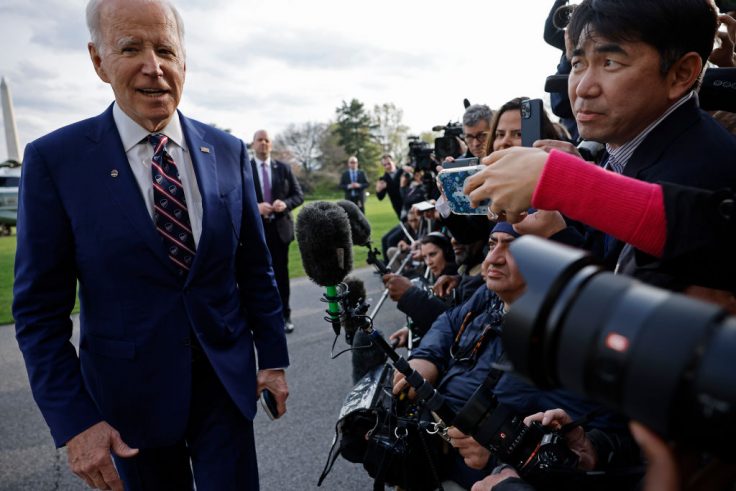The Biden administration tapped a liberal journalism academy that once promoted a "blacklist" of conservative outlets to train reporters on how to create "balanced and bias-free" journalism.
The Poynter Institute held the training course with reporters as part of a contract with the U.S. Agency for Global Media, according to a federal spending database. The agency, which paid Poynter $23,500 for the course through March 31, oversees Voice of America and other government news outlets.
The agency could seemingly use the training. Republicans have accused the organization of whitewashing stories about Iran and engaging in partisan advocacy in favor of President Joe Biden.
But Poynter may not be the best choice to teach journalists the art of unbiased and balanced reporting. While the organization bills itself as "nonpartisan," it is funded largely by wealthy Democratic donors George Soros, Pierre Omidyar, Craig Newmark, Bill Gates, and Tim Gill, an LGBT activist whose husband is Biden’s ambassador to Switzerland.
In 2019, Poynter released a "blacklist" of conservative news organizations, including the Washington Free Beacon, deemed "unreliable." Poynter retracted the list, called "UnNews," after widespread criticism. Poynter’s fact-checking site, PolitiFact, often displays pro-liberal and anti-conservative bias. A Free Beacon analysis found that of PolitiFact’s fact-checks of politicians, 62 out of 86 targeted Republicans. The site has also retracted numerous fact-checks later deemed inaccurate, including one in 2020 that said the theory that the coronavirus emerged from a lab leak in Wuhan, China, was "inaccurate and ridiculous."
In September 2020, Poynter executive Kelly McBride took part in a tabletop exercise held by the liberal Aspen Institute to plot how journalists, social media executives, and others would handle the hypothetical "hack and dump" of First Son Hunter Biden’s emails. The working group advised participants to treat any release of Biden documents with skepticism and to consult with other news organizations and intelligence officials before publishing stories based on the records.
Poynter appeared to follow the advice after emails from Hunter Biden’s abandoned laptop appeared in October 2020, when the organization lauded news organizations for ignoring the story. "Hardly any media outlets, except for conservative ones, are giving the story any credence at all," crowed one Poynter writer. McBride, the working group participant, is chair of Poynter’s Craig Newmark Center for Ethics & Leadership. Newmark, a major Joe Biden donor, contributed $5 million to Poynter and millions more to the Aspen Institute.
The government’s contract with Poynter comes amid heightened scrutiny of this growing network of think tanks and watchdog groups that purport to track disinformation. Many of the organizations involved in the network receive federal funding and have shown a tendency to label conservative viewpoints as misinformation.
The State Department has funded organizations like the Global Disinformation Index, which has advised companies to pull advertising from conservative websites, according to a Washington Examiner report.
Poynter and other organizations in the network have pressured social media companies to crack down on what they dub to be disinformation, raising concerns that doing so could lead to censorship of unpopular viewpoints. That pressure campaign has been lucrative for Poynter, which in 2021 urged Facebook to permanently ban former president Donald Trump over his comments about the 2020 election.
Last year, Poynter called on YouTube to beef up its moderation of misinformation, claiming the company was allowing its platform "to be weaponized by unscrupulous actors to manipulate and exploit others." YouTube and its parent company, Google, subsequently gave a $13.2 million grant to Poynter’s International Fact-Checking Network to help users identify misinformation.
The International Fact-Checking Network, which has received funding from the State Department, pulled a similar coup on Facebook. After offering to "engage with you about how your editors could spot and debunk fake claims," Facebook partnered with the Network and Politifact to provide misinformation analysis. Facebook now relies heavily on PolitiFact, the Poynter subsidiary, to fact-check news articles on its platform.
This is not the first time the U.S. Agency for Global Media enlisted Poynter to train journalists. The agency paid the group $20,100 in July 2021 to conduct four "balanced and bias" training sessions. The State Department has paid Poynter $360,000 over the years to train journalists in Japan, Thailand, Turkey, and India.
Poynter and the U.S. Agency for Global Media did not respond to requests for comment.
